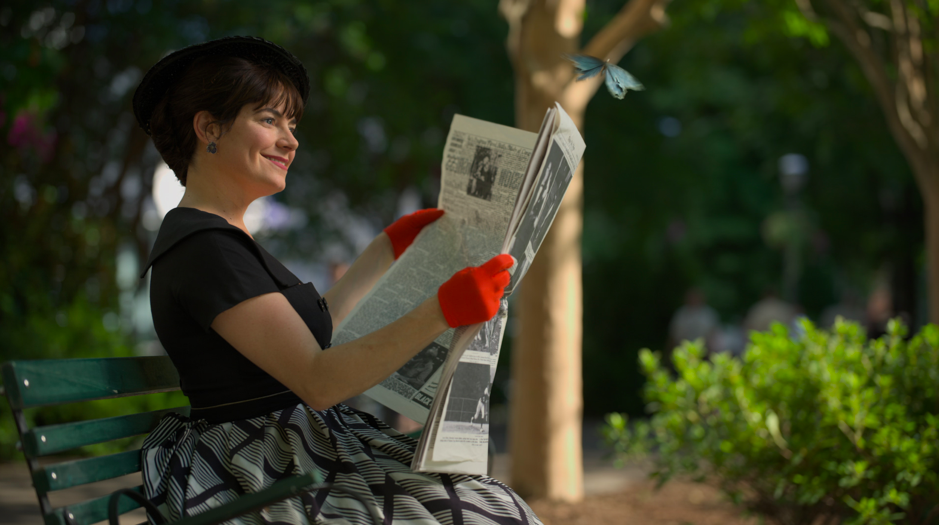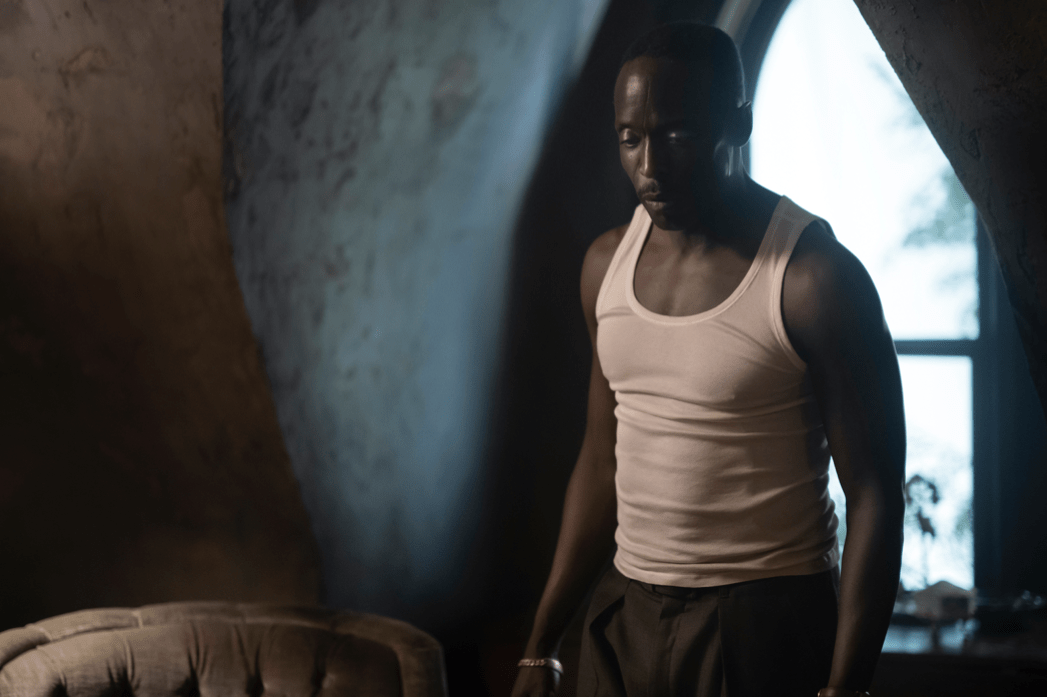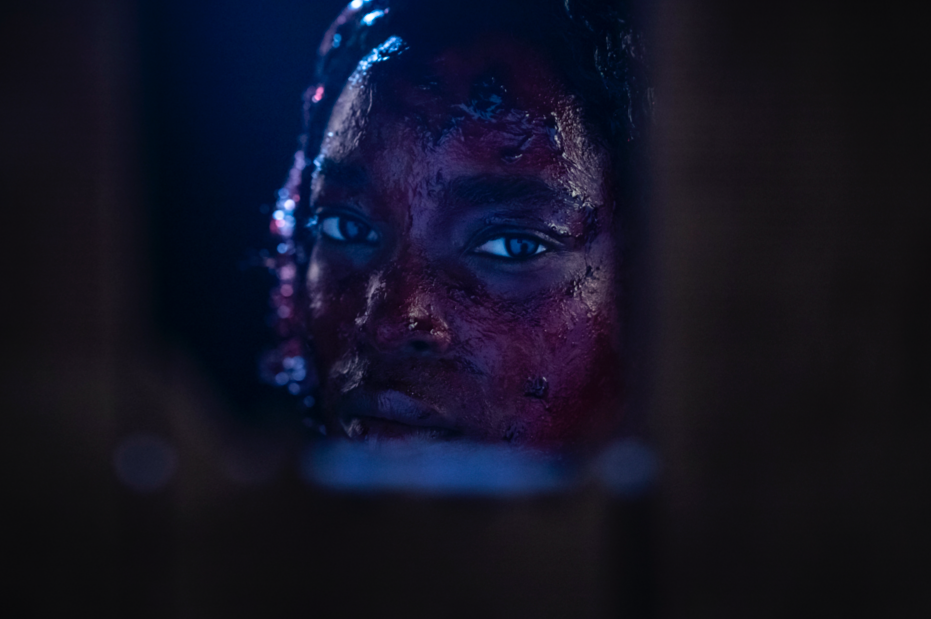By framing H.P. Lovecraft’s own white supremacist beliefs as the ultimate horror plaguing its heroes, Lovecraft Country’s given itself a way of focusing on scares that are more cerebral and emotional than the vicious, tentacled monsters the author popularised in his stories. But with “Strange Case,” the show spends some much needed time getting into the kind of gory muck that first pulled so many people into the horror genre.

The latest episode doesn’t full-on pull back from Lovecraft Country’s larger exploration of the monster that is anti-Black racism, but rather tackles it from a new angle by placing more of its focus onto Ruby Baptiste (Wunmi Mosaku), who up until this point in the series has been largely able to avoid all of the supernatural wildness her half-sister Leti’s been confronted with. “Largely” being the operative word here because “Strange Case” opens the morning after Ruby drunkenly decided to go home and hook up with Christina Braithwhite’s manservant William (Jordan Patrick Smith) who seems to have followed his employer to Chicago in pursuit of the ancient artefact she’s been searching for.
[referenced id=”1442550″ url=”https://gizmodo.com.au/2020/09/lovecraft-countrys-jonathan-majors-discusses-how-fear-is-the-key-to-atticus-evolution/” thumb=”https://gizmodo.com.au/wp-content/uploads/2020/09/12/nymbjnpux50l2zuxqjqh-300×169.png” title=”Lovecraft Country’s Jonathan Majors Discusses How Fear Is the Key to Atticus’ Evolution” excerpt=”Lovecraft Country’s veteran hero, Atticus Freeman, barely has time to become re-acclimated to his surroundings after a tour in the Korean War before he’s thrust on a quest into the magical wilds of New England, where his father has been captured by a cult of white supremacists.”]
True to what Ruby said in “A History of Violence,” waking up hungover after spending the night with a strange white man she met at a bar isn’t what she would call a new experience for herself. But as she comes to, shock sets in when she realises William was also being quite truthful when he promised her that he could change her life. As the fog of sleep clears from Ruby’s mind, she initially refuses to believe the truth that her eyes are telling her brain — that for some reason, her hands are unnaturally pale and unlike her own — but within moments of climbing out of bed, she realises that at some point during the night, her body was transformed into that of a white woman (Jamie Neumann) who she doesn’t know at all.
What makes Ruby’s inexplicable transformation so profoundly terrifying to witness is that even as she’s wandering through the streets in very appropriate hysterics given the situation, the groundwork Lovecraft Country’s laid for Ruby’s personality makes you understand that she’s likely fantasized about something like this in the past. Ruby’s frustration over not getting her dream job at the Marshall Field department store is twofold in that: a) she initially believed that she wouldn’t be considered for the gig because she’s a Black woman, only to learn that b) a Black woman did end up getting the job because Ruby never bothered to apply. Though Ruby clearly loves who she is, the story takes that little voice that lives inside so many marginalised, non-white people that asks “What would life be like if I were like one of them?” and mines that question to arrive at interesting answers.
Scared as Ruby is now that she’s become a white woman, Lovecraft Country very smartly zooms out for a few beats to convey how scary the situation is for all of the Black people in the neighbourhood white Ruby stumbles into. When Ruby, who’s having a total white woman breakdown, wanders up to the door of a Black barbershop, a man comes out to inquire if she’s OK as a number of onlookers gather to watch out of curiosity. Because Ruby still isn’t sure what to make of what’s happening, she panics and accidentally bumps into a nearby Black boy, knocking popcorn out of his hand and prompting a pair of white police officers to rush over and throw the boy to the ground believing that he somehow “molested” Ruby.

Even though the show very subtly nodded to the life of Emmett Till earlier in the season, this scene, in particular, lays bare the specific kind of danger white women have posed to Black boys and men, something Ruby’s able to bear in mind even in the midst of her episode. She has the wherewithal to tell the officers that the boy did absolutely nothing to her, which they’re both reluctant to accept as the truth, but before they can dwell on it for too long, the pair make a point of putting the still-transformed Ruby into the back of their cruiser and escorting her to her “husband’s” house on the white side of town.
Ruby’s sudden shift from being seen as a would-be accuser to being a sick woman in need of medication and her husband’s supervision encapsulates the ways that the power conferred by a person’s whiteness morphs depending on the situation they’re in and, in Ruby’s case, her gender. As a white woman existing near Black people, she was empowered to use her white womanhood as a weapon to cause devastating harm, but in predominantly white environments, she becomes just another woman meant to defer to the judgments of the men around her. The police think nothing of Ruby’s obvious fear of being brought to William’s home where he scoops her up only to lay her down on a floor covered in plastic as he goes to fetch a number of brutal looking tools. You can see that whatever magic that turned Ruby into her white counterpart is wearing off long before William starts to unceremoniously cut into her body as she wails in pain, but “Strange Case” also telegraphs that Ruby isn’t meeting her demise at William’s hand.
The story shifts to a helpful scene establishing Atticus, Leti, and Montrose were at the boarding house not long after Montrose murdered the two-spirit magical being Yahima. Sudden as Yahima’s death was (within the span of the same episode they were introduced in), Lovecraft Country wants you to grasp the guilt Montrose feels over his actions, even though he committed the murder out of a desire to protect his family from the Sons of Adam. But what Montrose doesn’t want to accept is that Atticus sees learning more about the Sons of Adam and his connection to them as a means of protecting himself, and so long as Montrose stands in his way, he won’t hesitate to fight his father. It’s unclear at first whether Atticus knows Montrose killed Yahima, but when he comes to the conclusion that his father definitely destroyed Titus’ pages from the Book of Adam, he flies into a rage that leaves his father bloodied and their relationship more strained than it’s ever been.

While Ruby makes a valiant effort of pretending to be asleep (surprise, she’s alive) in William’s bed as he strolls back into his bedroom after having had a shower, he soliloquizes about the nature of his transformative, potion-based magic that mimics the metamorphosis caterpillars undergo to become butterflies. When Ruby drops all pretense of being asleep and she and William begin to talk frankly about what happened and what he did to her, there’s an honesty between the two of them that cuts through the abject weirdness of it all. Traumatized as Ruby is, both she and William understand the level of freedom she was able to experience in her brief time masquerading as a woman, and on some level, they both know that part of her wants to feel that sort of freedom again. When William leaves another vial of his potion on the nightstand next to a wad of cash, he’s leaving the choice up to her, and it doesn’t prove to be a difficult one to make as the episode cuts to a montage of Ruby, in her white skin, relishing the opportunity to have a day to herself walking out in public completely unbothered and able to move as she pleases.
“Strange Case” repeatedly returns to the idea of sex being one of the most ultimate exchanges of power as the episode takes Atticus and Leti’s relationship to the next level and Ruby — in her Black skin — and William cautiously circle one another knowing full well that there’s a fair degree of attraction between the two of them. Leti and Atticus hooking up with one another comes as little surprise given their history, but the episode complicates things by having the pair get together only after Leti comes to Atticus revealing that she managed to take photos of Titus’ lost pages before Montrose had a chance to destroy them. Atticus’ quickness to anger as of late is easy to comprehend given everything he’s been through, but the ease with which he’s able to direct it at Leti (and the fact that, as of the last episode, he was quite ready to skip out of town) makes it hard to say whether or not Leti’s setting herself up for more trouble by becoming closer to him.
[referenced id=”1442640″ url=”https://gizmodo.com.au/2020/09/each-episode-of-lovecraft-country-now-comes-with-a-syllabus/” thumb=”https://gizmodo.com.au/wp-content/uploads/2020/09/13/jxzzn4tvxiju4hkoxc04-300×169.png” title=”Each Episode of Lovecraft Country Now Comes With a Syllabus” excerpt=”Lovecraft Country has as lot of powerful, distinct intersections with Black history, looking at the Black experience in the United States during the time in which it’s set through the lens of horror. It sure would be nice if someone put together a list of resources and reading materials to…”]
Ruby and William’s dynamic remains more explicitly transactional as she presses him about why he’s giving her access to his potions and what he’s inevitably going to want in return from her. William insists that Ruby’s simply the woman who happened to catch his eye, which we know to be an obvious lie given that Christina’s also pressing Leti, but Ruby allows herself to give in to the fantasy of it all and uses her newfound trick to get ahold of something she’s always wanted.
With Cardi B’s “Money” anachronistically (but very effectively) playing as her backdrop, white-Ruby, now going by “Hillary Davenport,” returns to the Marshall Field department store with plans finally get herself the job she wants, and in the end, Ruby’s resume is what ends up truly sealing the deal. Over the course of her interview, though, her new boss (Robert Pralgo) takes special care to bring up the fact that a number of the store’s employees quit in protest after corporate management made the decision to abolish its policy barring Black people from working there. The way the man brings this up is meant to work as a sort of temperature gauge to determine how “Hillary” feels about Black people, but for Ruby, it only serves to remind her that the mask she’s wearing is just that — a mask, and not who she really is. The episode spends time examining how the newfound freeness she feels as Hillary has the potential to become so intoxicating a force that it blinds her to the ways that whiteness encourages her to hurt people.
On Ruby-as-Hillary’s first day on the job, she makes a point of singling out Tamara (Sibongile Mlambo), the store’s only visibly Black employee, and putting her on the spot in a way that Ruby/Hillary at first believes to be somewhat encouraging. Ruby’s insistence that Tamara hold onto her confidence and belief in her own professional abilities are well-meant, but coming out of the mouth of a white woman, they land like thinly veiled threats. Things take an uncomfortable turn when Tamara admits that she, unlike Ruby, never graduated from high school. In that moment, Ruby’s self-loathing for having not applied to the job has a chance to morph into judgment of Tamara, even though the truth is that Ruby really should have just applied. Instead of using her position of authority to potentially make the company a more inclusive space, Ruby/Hillary instead finds herself bonding with her white colleagues and, for a time, becoming almost too comfortable in her new skin.

As plot-dense as it is, “Strange Case” makes the solid choice to fast-track through its plots involving Atticus and Leti, and Montrose, in favour of focusing on Ruby. While Atticus and Leti fight over whether or not the magic they’re both hunting for is evil, it’s revealed that Montrose is, in fact, queer the way Tree insinuated in the last episode. In two separate scenes, you see Montrose’s relationship with the barkeep Sammy is sexual, but not exactly intimate, as he refuses to kiss him during a slapdash sex scene that’s pulsing with shame. Later in the episode, though, you see that Montrose does find emotional support and comfort in Sammy and his group of drag performer friends, and for whatever reason, the things Montrose has been going through most recently finally puts him in a headspace where he can be open about his feelings for Sammy.
The night that Montrose accompanies Sammy to a bar where they’re able to feel safe and free enough to kiss one another in public, Ruby-as-Hillary, along with Tamara and all her white colleagues, happen to also be out on the town after the white Marshall Field workers insist on travelling to the Southside to go on “safari.” Whether it’s Ruby’s discomfort seeing her white peers treating the Black nightclub like a playground or her guilt over her treatment of Tamara, something compels Ruby to crush the vial of her transformation potion when her previous dosage wears off and she starts to revert to her normal state in the alley. Light on blood and guts as Lovecraft Country’s been up to this point, “Strange Case” puts Ruby’s metamorphosis on full display, and you see that the process, though magical, is disgusting and involves Ruby quite literally bursting out of Hillary’s body in a cascade of moulted human flesh.
Just after returning to her old self, Ruby happens to witness her boss cornering Tamara in the alley and attempting to sexually assault her, but because Ruby’s naked and covered in guts, all she’s really in a position to do is to flee as Tamara breaks free and runs for her own life. Were “Strange Case” to have more tightly compressed its final handful of twists, the episode might have managed to land on a slightly more shocking tone. When Ruby, bloodied, exhausted, and reconsidering just what kind of mess William’s gotten her into gets back to his mansion, she’s alarmed to run into Christina who knows a great deal about what Ruby’s been doing with William’s help. Even though Ruby’s instinct is to call it all quits and put distance between herself, magic, and William, Christina’s able to make her consider whether she merely wasn’t using the potions to achieve her true goals.
[referenced id=”1370384″ url=”https://gizmodo.com.au/2020/09/lovecraft-countrys-jurnee-smollett-opens-up-about-what-makes-leti-who-she-is/” thumb=”https://gizmodo.com.au/wp-content/uploads/2020/09/03/dfmqpdkx4n1nvoqmiqyi-300×169.jpg” title=”Lovecraft Country’s Jurnee Smollett Opens Up About What Makes Leti Who She Is” excerpt=”In the third episode of HBO’s Lovecraft Country, the series shifts gears in an interesting way as its heroes settle back into their lives in Chicago, newly aware that somewhere in America, there are white supremacist magic users vying to take control of the world through occult means. It’s the sort of…”]
When Ruby-as-Hillary returns to Marshall Field the next day to tender her resignation from the store, her supervisor’s stunned and confused until Ruby-as-Hillary convinces him that she’s only quitting so that she can safely act on her burning desire for him. Ruby’s former boss absolutely falls for it because, despite his outward appearance as a family man, he’s a depraved creep. She gets him onto his knees, partially bound and gagged in what he mistakenly believes to be the prelude to some sexually gratifying submission. What happens instead, though, is that Ruby begins to shed Hillary’s skin while using the heel of her stiletto to rape the man. When she’s through, she makes sure that he gets a good look at her knowing that even if he were to tell anyone what happened to him, no one would believe him.
Ruby’s exact motivations for assaulting her boss are open to interpretation, with the most obvious of them being that she went after him in retaliation for Tamara, who he almost assuredly would have raped if he’d had the chance. But the flashes of vindictiveness that surfaced in Ruby while she was living as Hillary suggest that might not be the whole story and perhaps there’s something more to William’s potion than he let on, a solid assumption considering what Ruby learns about him during their next encounter. The moment that Lovecraft Country introduced two platinum blonde evil villains and didn’t immediately establish what the exact nature of their relationship was, you could deduce that something was up with the show. Ruby’s shocked as she witnesses William go through the body-warping shift that she’s become so accustomed to over the past few days, but the moment when Christina steps out of William’s ruined form lacks the holy shit factor the episode is going for. Of course they’re the same person. The real interesting thing now is what’ll become of their relationship now that Ruby knows the truth.
“Strange Case” closes out by bringing its focus back to Atticus as he’s in the throes of deciphering the few pages of the Book of Adam he has access to thanks to Leti, and much to his surprise (but honestly, not anyone else’s who’s been paying attention), what he discovers is more than a little unsettling. When Leti mentions earlier in the episode that the magic Atticus is trying to figure out might be evil and one of the devil’s tools, she’s being a bit extra, but perhaps not wholly off the mark. The deeper they get into this Lovecraftian mess, the more imperiled they all become.
[referenced id=”1412522″ url=”https://gizmodo.com.au/2020/09/lovecraft-country-is-getting-to-the-root-of-everyones-pain/” thumb=”https://gizmodo.com.au/wp-content/uploads/2020/09/08/lovecraft-country-300×169.png” title=”Lovecraft Country Is Getting to the Root of Everyone’s Pain” excerpt=”Much as each of Lovecraft Country’s episodes have further expanded upon its strange world of eldritch magic and white supremacist occultists seeking to control it, the show’s never lost sight of the fact that it’s telling a complicated story about multiple generations of interconnected Black families working though all kinds…”]For more, make sure you’re following us on our Instagram @io9dotcom.
Editor’s Note: Release dates within this article are based in the U.S., but will be updated with local Australian dates as soon as we know more.
